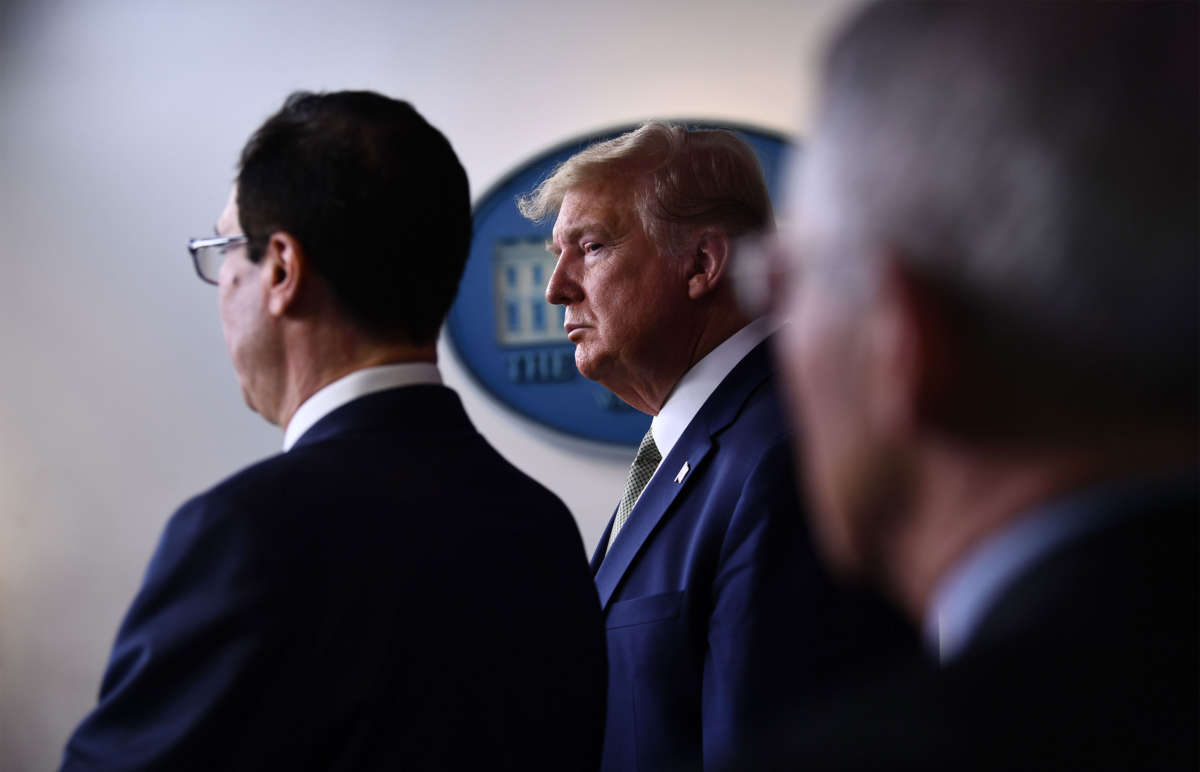After initially stating that there wouldn’t be a White House press briefing on Monday — which would have been the third straight day without one featuring the president or the coronavirus task force — Press Secretary Kayleigh McEnany said a briefing would happen after all.
Earlier in the day, McEnany explained that there was no need for a press briefing, as the press would be able to ask questions of the president during a separate event later in the day.
“We’re not tracking a briefing for today because there will be a press avail at 4 p.m. with the president and retail CEOs,” McEnany said. “There will be some briefings later in the week. They might have a new look to them, a new focus to them.”
But just before 2 p.m. Eastern Time, McEnany tweeted the change in plans.
“The White House has additional testing guidance and other announcements about safely opening up America again,” the press secretary wrote. “President @realDonaldTrump will brief the nation during a press conference this evening.”
UPDATE: The White House has additional testing guidance and other announcements about safely opening up America again. President @realDonaldTrump will brief the nation during a press conference this evening.
— Kayleigh McEnany (@PressSec) April 27, 2020
Rumors have abounded for several days now about a potential curtailing or end to the near-daily briefings, which have gone on for over a month now as President Donald Trump has tried to control the narrative about his response to the coronavirus pandemic. Sources close to the president on Friday told news site Axios that they had advised Trump against continuing the practice, telling him that they weren’t providing him much good in terms of creating a positive image for himself.
“I told him it’s not helping him,” one of those sources said. “Seniors are scared. And the spectacle of him fighting with the press isn’t what people want to see.”
Another source said it appears to have finally clicked for Trump that the briefings, though they were getting him large television ratings, weren’t doing him any good — particularly after his gaffe where he suggested that administering disinfectant could be looked at as a possible means to combat the disease.
Trump refused to answer questions from reporters last Friday. On Saturday, the first of three days so far when he did not hold a press briefing on coronavirus, Trump appeared to ruminate against holding the events in general due to his belief that the press treated him unfairly.
“What is the purpose of having White House News Conferences when the Lamestream Media asks nothing but hostile questions, & then refuses to report the truth or facts accurately,” Trump wrote on his Twitter account. “They get record ratings, & the American people get nothing but Fake News. Not worth the time & effort!”
What is the purpose of having White House News Conferences when the Lamestream Media asks nothing but hostile questions, & then refuses to report the truth or facts accurately. They get record ratings, & the American people get nothing but Fake News. Not worth the time & effort!
— Donald J. Trump (@realDonaldTrump) April 25, 2020
Time reported on Sunday that the White House would begin a shift away from daily briefings involving health experts, and put more focus on Trump’s plan to phase out stay-at-home orders in order to “reopen” the economy. The president has been pushing this shift for several weeks in order to ensure he has a positive topic to discuss during his run for reelection, according to sources with knowledge of his thinking on the matter.
Several members of his own coronavirus task force team are skeptical about quick moves to end stay-at-home orders, or to encourage states to “reopen” their respective economies at this time. Deborah Birx, for instance, has suggested that social distancing measures will need to last through the summer in order to be effective. Birx has also said she’s “concerned” over some states, like Georgia, ending measures too quickly.
